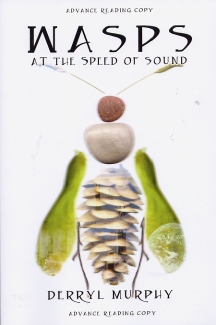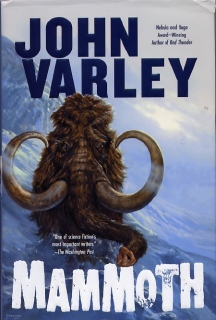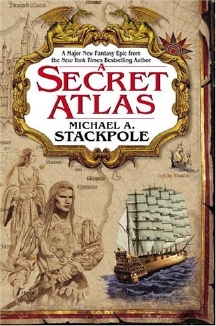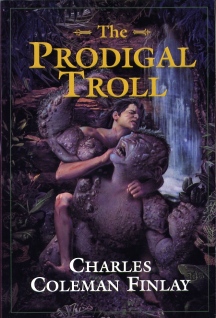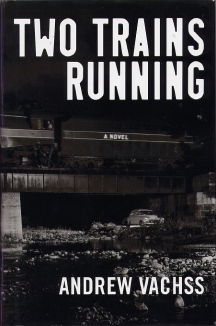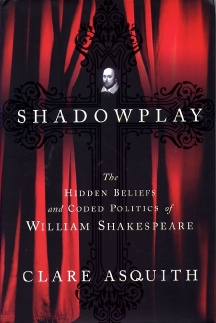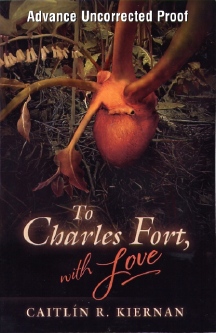|
|
|
This Just In...News from the Agony Column
|
06-10-05: Derryl Murphy 'Wasps At The Speed Of Sound'; John Varley's 'Mammoth' |
|||
Faster
Than The Impending Apocalypse
Meanwhile here at reading central, every day I see new books by new writers of high quality and serious strangeness that I cannot image getting published in the past. Not because they aren't high enough quality, but because in the past, hell, we walked ten miles in the snow to be able to find cheesy DAW mass-market paperbacks by Philip K. Dick. Today, we can order his entire back-catalogue in gorgeous and classy trade paperbacks from Vintage. And we can find the work of talented newcomers like Derryl Murphy online direct from the publishers -- or via one of many online independent booksellers, like Mark V. Ziesing Books and Andy Richards' Cold Tonnage -- books like Derryl Murphy's collection of short stories, 'Wasps At the Speed of Sound' (Prime Books ; July 2005 ; $17.95 TPB / $29.95 HC). In a time when publishing's mega-rock star Chuck Palahniuk tells me that even his publishers balk at the idea of a collection of short stories, here is Prime Books offering a top-notch collection of stories by a Canadian writer whose work has appeared only in magazines that are not exactly grocery store or even chain bookstore shelf-fodder. Mind you, I have worlds of respect for the publications where the stories in this collection first appeared. Tesseracts, On Spec and TransVersions are all excellent venues. But they're not exactly Ladies Home Journal, Rolling Stone or even F&SF. It's a testament to the actual vitality of the publishing world that Prime can bring out high quality titles like this. Of course, this title is not going to appear in thousands of bookstores, and it doesn't need to. Sean Wallace is going to get this book to the people who actually want to read it, and plenty of people do. And even more people should want to read it. 'Wasps At the Speed of Sound' is an excellent collection of stories that pretty much cannot be easily categorized. There's a running theme of "Us versus the environment" in the stories here, but it expresses itself in a range that varies from fictional-non-fiction ('The History of Photography') to apocalyptic science fiction ('Lost Jenny') to eco-horror ('Wasps At the Speed of Sound'). Readers who aren't married to any particular genre, readers who like their fiction to offer variety, integrity, imagination and verve will find that Derryl Murphy takes them just where they want -- but dont expect -- to go. Of note as well is the introduction by fellow Canadian Peter Watts who has more fun in a short space than he has any right to. And as a fan of such things, I enjoyed Murphy's own introductions to his stories which provide the perfect blend of insight and entertainment. Should you crave more, check out his blog. Yes, it's true that you won't have to hide under a rock to avoid this book. You might have to expend enough energy to stroll down to your local genre fiction specialist to snatch it off the shelf. Should you have no local genre fiction specialist, you'll have to find it online, order it at your independent bookseller, or direct to the publishers. It's my guess that a certain fraction of these books will reach the shelves of Borders, perhaps. Their SF&F guy is pretty damn spot-on. But anyone who is reading about this book here has absolutely no problem in finding it, even if I am phobic about providing income generating links to sell books. I hope my readers appreciate my scrupulous ability to avoid these tiresome (to me) online links. Yes, I do link to my favorite independents, and I hope you go to them to buy your books and even tell them I sent you. That would be good. But the bottom line is that these are the End Times of Publishing as we know it. No longer are a few publishers offering everything we want whether we want it or not. Oh those publishers are still there, and yes, everyone who needs more diet information than, "Eat less food," will find themselves quite well served by their offerings. But small press publishers like Prime, like Night Shade, like Subterranean Press, like Cemetery Dance are here to offer those who want something more titles like 'Wasps At the Speed of Sound'. And happily enough, they're offering us the choice of trade paperback and hardback copies of the book published simultaneously. One for the archive, one for the taqueria. Yes, the end Times of Publishing are here. With a side of guacamole. |
|||
Not
a Shaggy Elephant Story
I've mentioned before how far back my reading of Varley's work goes. I remember reading 'Air Raid' and later, 'Millennium', clutching the yellowed paperbacks. No more clutching or yellowed paperbacks for that matter. 'Mammoth' begins as eccentric multi-billionaire Howard Christian decides it would be a good idea to clone a mammoth. Not that this is anything new. Two years ago, Japanese and Russian scientists decided that they were going to do just this. But luckily for them, they aren't eccentric multi-billionaires. Because if they were, then maybe they'd be fortunate enough to send out their frozen mammoth hunters to find that Big Hairy One that is accompanied by an equally well-chilled stone-age man. Wearing a wristwatch. Now, I dont think that he's carrying an iPod with Spinal Tap songs. But. This does offer a confirmation that we're not dealing with an elephant-out-of-place story. Rather, we have a human out of place, and out of time. Varley is currently touring to support his book, and you can catch him at Borderlands Books, one of the places where you will surely be able to find Derryl Murphy's collection. He'll be at Borderlands on July 24; you can catch up with him elsewhere by checking his website for tour dates. Unless, of course, you're planning on time traveling to see him. In which case, make sure you bring non-yellowed paperbacks to the signing. |
|
06-09-05: Michael A. Stackpole Opens 'A Secret Atlas; Charles Coleman Finlay's 'The Prodigal Troll' |
|||
| The
Power of the Map by Terry Weyna
Well, then, Michael A. Stackpoles 'A Secret Atlas: Book One of the Age of Discovery' (Bantam Spectra, $15.00, March 1, 2005) might be just the thing. Its pure and simple fun, even if its not really the “captivating new fantasy saga unlike anything youve ever read” that the jacket copy claims for it. Its about the power of maps – thats the somewhat original part of it – and its about family politics regarding the family talent, the dangers inherent in magic, quests for strange lands and odd things, and murder. A Secret Atlas follows the thread of much fantasy these days in that it gains its setting and tone from the Asian world, rather than from Celtic myth or the Brothers Grimm, so were treated to honorable swordplay, much bowing, and a reverence for elders quite foreign to modern day America. Theres a reason that Stackpole appears from time to time on the bestseller lists. His writing is smooth and rarely obtrusive, almost pure story. When a full-fledged description interrupts the dialogue, its usually a description of a sword fight. The characters are familiar types – the good grandson, the rebellious grandson, the spiritual swordfighter with honor, the arrogant student swordfighter, the nasty patriarch, and so on. Its not at all a surprise when you go to Stackpoles website and learn that it takes him about 200 hours to write a 100,000 word novel, and that hes a game designer as well as a writer – it fits with the flow of the book, which moves at the pace of a decent adventure movie. What it comes down to is that this book is comfortable. You know what youre going to get. You can pick it up and go away for a few hours, even be surprised when you surface to find youre not wearing a kimono, but a pair of jeans and a tee shirt. All those worries, all those petty anxieties, disappear as you float down the river of the story. And thats a very good thing to be able to say about a book, all by itself. |
|||
| The
Changeling Child by Rick Kleffel
So it's with no small amount of anticipation that I greet 'The Prodigal Troll' (Pyr / Prometheus Books ; June 7, 2005 ; $15.00 TPB / $25.00 HC), by Charles Coleman Finlay, the latest and darkest turn on this venerable trope to come round in quite some time. Finlay is a fascinating author that we've covered recently for his collection 'Wild Things'. His short stories have been nominated for just about every award that you can name, and one suspects that his novel may share that fate. 'The Prodigal Troll' spins from a classic set-up. Lord Gruethirst's heir is sent off when the castle is attacked by an invading baron. But when the invasion succeeds, Lord Gruethirst's son, the infant Claye, falls into the hands of a grieving troll who has just lost her own son. Christened Maggot by his unhappy step-father, the boy grows up in a society that is crude by human standards but also democratic. It prepares him for a rough life amongst the monstrous trolls, but not a return to human society, where -- no doubt -- he must win back his ancestral lands and the hand of the fair lady, in this case Portia. The same skills that earned Finlay praise in the short story world will no doubt serve him well in the world of novel writing, though the transition from one to the other is not necessarily easy. Of course, Pyr makes this novel incredibly easy on the reader, by offering both a trade paperback version for your beach reading and a hardcover version for your archival and Demco white-glove reading. And the price of the trade PB is low enough so that those who are worried about experimenting with a first novel by a new author can do so with a fair amount of impunity. The type is very nicely large with a large leading that makes this book quite easy on the eyes. And it's the same in both versions. Monster-o-philes like myself will enjoy the lovely painting by new-to-me Brian W. Dow. Look, it's pretty easy to get this straight. You should simply tell your bookseller to send you everything that Pyr publishes, in all versions. It wont be long before publishers twig to the potential profits behind the subscriber model. Get yourself signed up and used to it. |
|
06-08-05: Andrew Vachss Catches 'Two Trains Running' |
|||
Crime
and Politics -- and Punishment
So 'Two Trains Running' looks to be the utterly perfect novel for myself and legions of readers like me, those of us who enjoy Vachss' artistic skill but simply can't handle stories of horrific child abuse. 'Two Trains Running' is a significant departure for Vachss, a historical mystery set in the devastated mill town of Locke City in 1959. Royal Beaumont is the boss of Locke City, a position he intends to keep. But his position is threatened by an invading crime syndicate, neo-Nazis, black revolutionaries, the IRA, the Mafia proper, the FBI and whoever it is that is watching the FBI -- most likely the Fraternal Union of Kitchen Sinks. His response is to call in a hired killer who specializes in wholesale destruction, because, well, overkill is never enough. So what we have on offer from the ever-interesting Mr. Vachss is a complex, detailed historical thriller, a gritty noir that is written in micro-chapters to keep you pasted to your chair through the sweaty summer nights. What Vachss is getting at is no less than the inception point of the forces that are twisting our country to this day, the collusion of crime and business, of violence and persuasion that run underneath our television reality and representative democracy like cancer, the rotting inside of a dying society. Vachss' vision in 'Two Trains Running' is no less than an attempt to un-re-write the history books. Like Chuck Palahniuk, he's interested in the storyteller and the story told, the way in which the winners who have written history have shaped the world we inhabit. In his Burke novels, Vachss spoke the truth about child enslavement and pornography here, in America, in a way that made everyone uncomfortable -- even me. It's only natural that he should turn his eye to the society at large that made those monsters. It's only natural that he should use the same skills that served him so well in the Burke books -- the ability to mix truth into his fiction in such a fashion that readers can swallow the poison without dying. And it's only natural that the result should be something compelling, gripping, and over-the-top. Whats different here is that Vachss now sees a light at the end of the tunnel, a force that can combat the cancer within -- investigative journalism, which he deems "the one faithful force for progressive social change." In an era when that very force is in retreat, on the run, when the glories of yesteryear's investigative journalists shine a shameful light on the inadequacies of today's quelled press, it's more than interesting that Vachss should deign to demonstrate his support. It's a sign of hope -- and a book that demands to be read. |
|
06-07-05: Clare Asquith's 'Shadowplay' |
|||
Shakespeare's
Hidden Politics
It can also be done with more historical works, from Christopher Marlowe to Jonathan Swift. Marlowe, in fact, was recruited to write politically slanted plays by the state's intelligence services, but by the time he wrote 'Doctor Faustus', he was clearly expressing Catholic points of view when he portrayed the death of the good Doctor. In 'Edward II' he finally hewed too close to the facts and made his distaste of his employers clear and was murdered by the state's intelligence agents in 1593 at the age of twenty-nine. Marlowe was a contemporary of Shakespeare, and they lived in dark and dangerous times, dangerous times that might seem quite familiar to readers of the present. The State, (ie Elizabeth I, "the Crown") had a Church it preferred to support, the Anglican Church. And the State had no love of the Catholic Church, or anybody else for that matter. The State became a Police State. It was an age of terror, fear of terror, summary imprisonment, a state-approved Church that had all the answers, torture, brutal executions and land seizures. Yes, I'm talking about late sixteenth and early seventeenth century England. All the sorts of things that sent the larval Americans across the Atlantic to set up the Land of the Free and the Home of the Brave. Yes, I digress. The question one might have about all this is how one William Shakespeare, about as sensitive an artist as you could ever hope to find, managed to write a series of plays that defined English literature but avoided political comment. The mind that created 'Romeo and Juliet' seems rather silent on the political issues that surrounded him. But not if you know where and how to look. In 'Shadowplay: The Hidden Beliefs and Coded Politics of William Shakespeare' (PublicAffairs / Perseus Books Group ; May 10, 2005 ; $26.95), Clare Asquith shows readers where and how to look for the politics that Shakespeare coded into his plays. Asquith does this by tracing the common code used by the dissidents of the sixteenth century to discuss the terrors of their age. What she finds is that Shakespeare was a master of this secret language, and that through the lens of this argot, one can easily discern the political agenda behind his artistic output. But what makes this book particularly compelling is not the revelation of Shakespeare's political criticisms, but the implications of those criticisms as they shed light on the mysteries in Shakespeare's life. Asquith combines literary insight, political revelations, relevant politics and historical sleuthing to offer readers a compelling look at our greatest writer, ever. 'Shadowplay' includes a glossary of the coded terms in Shakespeare, and a fascinating analysis of Sonnet 152. What more can one ask for than a book that will transform your understanding of the work of Shakespeare? This book is clearly a gift to readers who want to re-read the greatest stories ever written. It's your first chance to get to know Shakespeare the political dissident. You second chance will come when you open his complete works. |
|
06-06-05: 'To Charles Fort, With Love' from Caitlin R. Kiernan |
|||
Stories of the Damned
But the influence of non-fiction authors on writers of fiction is not always obvious, nor is it as often acknowledged. Caitlin R. Kiernan goes a long ways to pay homage to one of genre fiction's most important and under-acknowledged influences with her new and highly anticipated collection 'To Charles Fort, With Love' (Subterranean Press ; September 27, 2005 ; $25.00). Such a bargain! With a to-die-for cover from Ryan Obermeyer, this collection could easily be followed by several multi-author anthologies. Charles Fort, as the readers of this column surely know, was the early-twentieth century writer who collected news clippings that described bizarre, weird and unexplained events that he deemed "damned" -- that is excluded -- by the world of science. He was the original man to create his own set of X-Files, which he managed to get published with the help of his friend Theodore Dreiser. His books, including 'The Book of the Damned', 'Lo!' and 'Wild Talents' have inspired writers of weird fiction for generations, and will continue to do so. This is due to more than the content. Fort himself has a witty and utterly post-modern attitude towards the events he describes. He's relentlessly funny as well. Kiernan's collection for Subterranean Press, which we first heard about from her in this column, includes stories written over a five-year period from 1999 to 2004. She introduces them with a very perceptive and entertaining essay 'Looking For Innsmouth', reflecting a fictional influence -- Lovecraft -- who himself was clearly inspired by the weird events that Fort reported with such charming aplomb. Included are the stories in 'The Dandridge Cycle', 'A Redress for Andromeda', 'Nor the Demons Down Under the Sea', and 'Andromeda Among the Stones'. These stories comprise a nice chunk of sixty pages and include illustration by Richard Kirk. Each story features an afterward by Kiernan and the collection itself includes an afterward by Ramsey Campbell, who is also clearly writing under the influence of both Lovecraft and Fort. Any reading of 'The Book of the Damned' will clearly demonstrate the depth to which Charles Fort has influenced all genre fiction. Horror, science fiction, mystery, slipstream, all owe a debt to the man who cast doubt on what the authorities deemed to be damned. These days, nearly all fiction wants to tread outside the world of the acknowledged expert, to peer into the complicated and unknowable heart of man. In so doing, all fiction stands in the shadow Charles Fort. By being the first to publicly, clearly and pointedly acknowledge the inspiration of Charles Fort, Kiernan places herself at the front of the school and the head of the class. And, as well, at the top of our to-buy list. Moreover, this is a smart marketing move. Readers know that 'The Fortean Times' has a pretty damn big subscriber list and a bigger set of fans. Here's a book tailor made for them, a book that itself is certainly not damned. |
